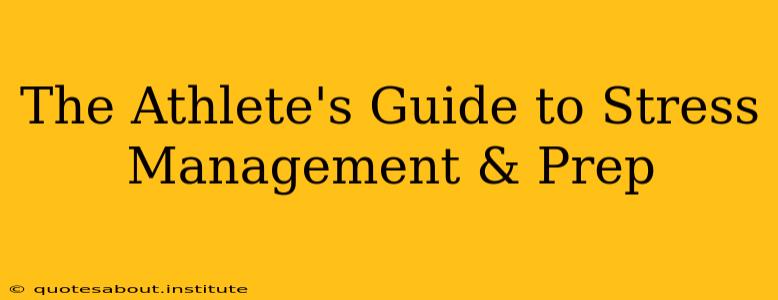The Athlete's Guide to Stress Management & Preparation
For athletes, the pursuit of peak performance is a constant balancing act. Training, competition, and the pressure to succeed can create significant stress, impacting both physical and mental well-being. This guide explores effective stress management techniques and pre-competition preparation strategies specifically designed for athletes of all levels. We'll delve into practical methods to help you navigate the demands of athletic life and optimize your performance.
What are the best ways for athletes to manage stress?
Stress management for athletes isn't just about relaxation; it's about building resilience and developing coping mechanisms to handle the unique pressures of athletic competition. Effective strategies involve a multifaceted approach:
-
Mindfulness and Meditation: Regular mindfulness practice, even for just a few minutes each day, can significantly reduce anxiety and improve focus. Apps like Calm or Headspace offer guided meditations tailored to athletes. The key is consistent practice.
-
Breathing Exercises: Deep, controlled breathing techniques, such as diaphragmatic breathing or box breathing, can quickly calm the nervous system and reduce physiological responses to stress. Practicing these techniques before competition can help center you and improve performance.
-
Progressive Muscle Relaxation: This technique involves systematically tensing and relaxing different muscle groups to relieve muscle tension and promote relaxation. It's particularly helpful for athletes who experience physical tension related to stress.
-
Visualization: Mental imagery techniques, where athletes visualize successful performances, can boost confidence and reduce anxiety. This mental rehearsal strengthens neural pathways associated with successful execution of skills.
-
Cognitive Behavioral Therapy (CBT): CBT helps athletes identify and challenge negative thought patterns and develop more adaptive coping strategies. A sports psychologist can provide personalized CBT techniques to address specific stressors.
How can athletes reduce pre-competition anxiety?
Pre-competition anxiety is a common experience, but its intensity can significantly impact performance. Strategies to manage this anxiety include:
-
Routine and Preparation: Establishing a consistent pre-competition routine helps create a sense of control and predictability. This might involve a specific warm-up, visualization exercises, or listening to calming music.
-
Positive Self-Talk: Replace negative thoughts with positive affirmations and focus on your strengths and past successes. Positive self-talk can significantly boost confidence and reduce self-doubt.
-
Controlled Breathing: As mentioned earlier, controlled breathing exercises are incredibly effective in reducing anxiety in the moments leading up to competition.
-
Acceptance: Accepting that some level of anxiety is normal can reduce the pressure to eliminate it completely. Instead of fighting anxiety, focus on managing its intensity and using it to your advantage (as a source of energy).
-
Pre-Competition Meal Plan: A well-planned meal and hydration strategy can significantly impact performance and reduce anxiety related to energy levels and physical discomfort. Consult a sports nutritionist for personalized advice.
What role does sleep play in stress management for athletes?
Sleep is crucial for both physical and mental recovery. Insufficient sleep exacerbates stress, impairs cognitive function, and reduces athletic performance.
-
Prioritize Sleep: Aim for 7-9 hours of quality sleep per night. Establish a regular sleep schedule and create a relaxing bedtime routine to optimize sleep quality.
-
Sleep Hygiene: Create a conducive sleep environment by minimizing noise and light. Avoid caffeine and alcohol before bed.
-
Address Sleep Disorders: If you suspect a sleep disorder, such as insomnia or sleep apnea, seek professional help. Untreated sleep disorders can significantly impact stress management and athletic performance.
How can athletes use nutrition to manage stress?
Nutrition plays a significant role in stress management. A balanced diet provides the body with the essential nutrients needed to cope with stress.
-
Balanced Diet: Focus on a diet rich in fruits, vegetables, whole grains, and lean protein. These foods provide essential vitamins and minerals that support the body's stress response.
-
Hydration: Dehydration can worsen stress symptoms. Maintain adequate hydration throughout the day, especially during training and competition.
-
Limit Processed Foods and Sugar: Processed foods and excessive sugar can exacerbate stress and contribute to energy crashes.
-
Consider Supplements: Consult a doctor or registered dietitian before taking any supplements, but some, like magnesium, are known to support relaxation and stress management.
What are some relaxation techniques for athletes?
Beyond the techniques already mentioned, other effective relaxation methods for athletes include:
-
Yoga and Tai Chi: These practices combine physical postures, breathing techniques, and meditation to promote relaxation and improve flexibility.
-
Spending Time in Nature: Studies show that spending time outdoors can reduce stress hormones and improve mood.
-
Listening to Calming Music: Music can have a powerful impact on mood and relaxation. Choose calming music to help reduce anxiety and promote relaxation.
-
Massage Therapy: Massage can help relieve muscle tension and promote relaxation.
By implementing these strategies, athletes can effectively manage stress, enhance their mental fortitude, and ultimately optimize their athletic performance. Remember that consistency is key; incorporating these techniques into your daily routine will yield the greatest benefits. Seeking guidance from a sports psychologist or registered dietitian can further personalize your approach and maximize your results.

